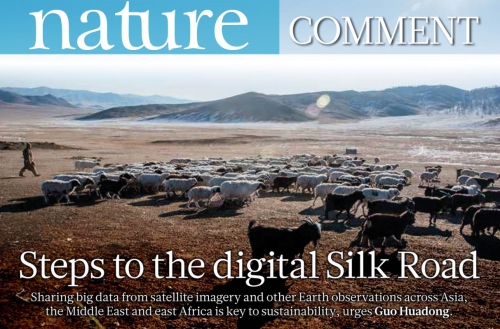

Guo Huadong, an academician of the Chinese Academy of Sciences (CAS), research fellow of the Institute of Remote Sensing and Digital Earth, CAS, and chairman of the Digital Belt and Road (DBAR) Program, published a comment article in the international academic journal of science, Nature, on Jan 30.
In the article, Steps to the digital Silk Road, Guo called on global scientists to build a digital Silk Road using big Earth data to serve the sustainable development of the countries and regions involved in the Belt and Road Initiative.

Nature publishes comment article Steps to the digital Silk Road.
(IMAGE FROM INSTITUTE OF REMOTE SENSING AND DIGITAL EARTH, CAS)
This was the first time Nature has published an article on the Belt and Road Initiative written by a Chinese scientist. It mirrors the international science and technology community's recognition of the initiative and its awareness of the role of science and technology in promoting Belt and Road construction.
Guo analyzed the problems and challenges of environmental change, food security, urbanization, world heritage sites, and natural hazards exposed in countries and regions involved in the Belt and Road Initiative. And he illustrated four problems in the countries participating in the initiative: insufficient data resource sharing, the digital divide between developed and developing countries, unbalanced development, and a lack of mechanisms for effective exchange and cooperation.
Guo chairs the Digital Belt and Road (DBAR) Program initiated in 2016, which has now gained support from Chinese scientists in cooperation with experts from 26 countries and international organizations. The program aims to improve environmental monitoring, promote data sharing and support policymaking using big data in Earth observations.
It has seven workshops, two task forces and eight branches: Pakistan and Thailand in Asia; Finland, Italy, and Russia in Europe; Morocco and Zambia in Africa; and the US in North America.
According to the recently released DBAR Science Plan, the program will conduct research on the digital Silk Road over the next 10 years to facilitate decision-making related to the Belt and Road Initiative and promote the healthy and sustainable development of affected countries and regions.
Source: Institute of Remote Sensing and Digital Earth, CAS